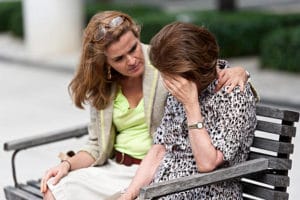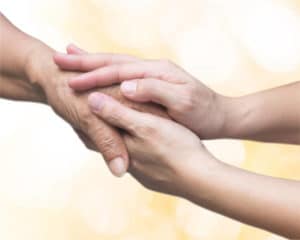If you are unsure whether the government should invest more in caregiving, this article is for you. I recount the experience of a couple: Yanick and Gisèle. Their sincere and powerful testimony. Here's how they became seasoned caregivers.
How it all began...
Yanick and Gisèle take care of the brother and sister-in-law of Yanick. They take care of them with a human approach. Empathy. Without judgement.
The brother and sister-in-law of Yanick, a couple without children, both have a neurocognitive disease. They are incapable of taking care of themselves and administering their property.
In the winter of 2021, Yanick's brother and sister-in-law were placed in a CHSLD. Since the placement in an institution, Yanick and Gisèle, who are retired, devote an average of ten hours per week for the two beneficiaries.
The two caregivers have always been very close to Yanick's brother and sister-in-law:
“Before the placement, we were resourceful persons for everything. Never did they think to call upon somebody else of the family to ask for advice. They always had an unlimited confidence in the two of us.”
Before their placement, the brother and sister-in-law of Yanick would see just a few people except for Yanick and Gisèle. They were very isolated.
The big challenges of Yanick and Gisèle
Absence of medical power of attorney
Yanick and Gisèle describe their experience as caregivers as painful since neither Yanick's brother nor sister-in-law has a notarized power of attorney. Yanick must therefore make all the medical decisions even though his brother and sister-in-law have never spoken to him about it:
“If he/she gets a virus, do you give us permission to give him/her antibiotics? Can we put him/her under an oxygen tent?”

Yanick points out how difficult it is to make intimate decisions for another person:
“I take a decision but I tell myself is it what they want? Is it what they would have wanted? To take a decision, I ask myself what I would want.”
Power of attorney for the administration of property
The fact, therefore, of not having a power of attorney greatly complicates the care:
“Every time you telephone for them (ex: stop a credit card) the first question that they ask you is do you have a power of attorney? You do not have a power of attorney? I cannot answer you.”
To proceed with the placement without a power of attorney tired Yanick and Gisèle physically and morally. From a theoretical point of view and on a legal level, they did not have the right to empty the apartment of the brother and sister-in-law of Yanick nor to manage their property. Thus the law gives two months to the occupants to leave their accommodation when there’s a placement in a CHSLD.
So what could Yanick and Gisèle do?
Nothing more than what they did.
This is to say that "the law is made for those who have signed papers" to use Yanick's expression.
The finances
Yanick's brother and sister-in-law will eventually be under the supervision of the government for the management of their property, but in the meantime, it is the two caregivers who pay for them:
“I have fallen on someone that thinks like me, who has a big heart like me.” (Yanick)
And yet, despite their financial involvement, Yanick and Gisèle are not aware of any government economic support.
But Yanick and Gisèle go for it. They don’t give up hope. And this, even if their well-being takes a hit.
Well-being of the caregivers
Indeed, between the visits to the CHSLD, shopping for clothes for their loved ones, empty the apartment, pick up the mail, it’s enough to be exhausted considering that Yanick and Gisèle are not getting any younger. This sometimes results in less healthy food choices and inability to indulge in leisure activities.
Yanick feels like she has a load on her back: “I am responsible for two human beings.”
Since the move of her brother, Yanick has health problems: “It’s going to get better, I am sleeping better, but there were nights, at the beginning, I didn’t sleep.” »
The sadness
Being a caregiver has its share of emotions. Yanick tells that she can come out of the CHSLD with a smile, or she needs her spouse to give her support because her brother wanders completely.
“The last time I went to see my brother, he did not recognize me. My brother can't help but recognize me!”
Yanick finds that the pre-death grief associated with a neurocognitive disease (https://www.lappui.org/Conseils-pratiques/Alzheimer-et-autres-maladies-neurodegeneratives/Comment-se-preparer-au-deuil-blanc) is harder than the mourning of a deceased because it lasts a long time.
“I am always worried. Is he going to lose more autonomy? I’m scared and I feel bad that it will go further. It’s the uncertainty and the unknown.”
Moreover, because many people surrounding Yanick and Gisèle are in loss of autonomy, this makes many griefs at the same time.
The guilt
There is not only sadness, but also guilt:
“I blame myself. I should have gone earlier to see that it was not going well. If they would have had help earlier, perhaps they would have not been at the same point as they are right now. I feel guilty when I do not go see my brother. I feel guilty about everything. I feel guilty that I don't go see him more often. I want him not to need anything. I feel guilty for not thinking of everything.” (Yanick)
Little support from the extended family
Yanick has also found it difficult that none of the members of her extended family called to get news neither of the brother nor her sister-in-law. She asks herself if they fear having to get involved in the care or if it’s indifference.
“It made me sad, I got used to the idea, but I would have liked to receive a little slap on the shoulder, a little word.”
Caregiver resources
Yanick and Gisèle consider themselves not too well informed of resources for caregivers. They also received support from professionals in the legal field (notary, lawyer).
The pandemic
Without a doubt, the pandemic imposed constraints on Yanick, Gisèle and to the brother and sister-in-law of Yanick. For example, before being admitted to the CHSLD, the brother of Yanick was hospitalized because he suffered from undernutrition and dehydration. In spite of this painful situation, Yanick could not visit her brother at the hospital because of the COVID-19.
Another example: between the hospital and the CHSLD, Yanick's brother was placed in a closed center (buffer zone due to COVID-19).
“He would scream in the corridor, Yanick bring me with you. I did not do anything. Why am I in prison? I collapsed in the elevator.”
In addition, in the buffer zone, the brother of Yanick could not walk like he was used to. He had to stay in his room for two weeks. And he did not understand when they gave him explanations.
COVID-19 is also:
- The right to have a maximum of two visitors, but not together and not on the same day.
- The obligation to make an appointment. To give the arrival and departure times.
- To be accompanied to get to the beneficiary’s room and to go back down.
- The wearing of the mask and visor, which prevents having good contact with residents (difficulty to recognize one another).
- The beneficiaries, like the brother of Yanick, who don’t understand why they cannot hold in their arms their loved one.
What helps Yanick
The fact of being retired
In the context of the placement in a CHSLD, Yanick and Gisèle have given support to the brother and sister-in-law of Yanick during about two months for 4 days a week.
They say they could not have offered this support if they had worked. The reason being that all health professionals call for the day:
“When you work, you cannot receive ten calls per day.”
Yanick and Gisèle think that the job market is not suitable for caregivers. That only certain jobs are more flexible and allows the conciliation work/caregiving.
The support of Gisèle
Gisèle offers a big emotional support to Yanick. She is a very good listener. If Yanick feels like crying, she cries. Yanick wouldn’t trade this support for the world.

Yanick thinks it must be terrible for a caregiver who does not have support. According to her, a caregiver who does not receive support would be less healthy or would be more fragile emotionally.
The qualities of Yanick
Yanick’s own internal resources help her to be more serene about what she is going through. Indeed, Yanick loves people as they are, without judging them. She is also generous and she expects nothing in return.
Collaboration with the treatment teams
Yanick finds the treatment teams of her brother and sister-in-law extraordinary. The medical information circulates very well, and if she has questions, the staff is very open.
“Like yesterday, the dietician called me to find out what he likes, what he doesn’t like, does he have allergies, and food intolerances. What does he eat usually for breakfast?”
The treatment teams hold interdisciplinary meetings in which Yanick participates. Each professional or worker explains their role to the beneficiary. And each time:
“Do you think we could do something else? Then I give suggestions. Yes, it’s a good idea. No, we don’t think so.”

Yanick finds that the beneficiaries are respected and well supervised. The atmosphere is calm and like a family.
The good times
Fortunately, the good times put a balm on the difficulties experienced. Yanick is always happy to see her loved ones: “I love them.”
She enjoy their happiness:
“I have the impression that he still takes me for his little sister. He explains things to me. I feel that he is happy about that. If he is happy, I’m happy. It doesn’t matter if what he says doesn’t make sense.”
Or:
“It’s the first time in 20 years that my sister-in-law tells me that she’s happy. It makes me happy to hear this. It’s like I made the right choice.”
And to conclude
Yanick and Gisèle told us about their unique experience as caregivers. They discussed their isolation, heartbreaking decisions, fatigue, sadness and guilt.
But far from admitting defeat by the many challenges of caregiving, they have awakened empathy and hope.
They have shown the importance of Support. Support in all its forms: economic, within the labor market and resources for caregivers.
I wish to thank Yanick and Gisèle for sharing their story.
If this story talks to you, send me your thoughts, I will be happy to discuss with you. If you want to share it with your loved ones, share as much as possible.

I was more than happy to find this great site.
I want to to thank you for ones time due to this wonderful read!!
I definitely liked every bit of it and I have you bookmarked to check out new things on your
web site.
Very descriptive blog, I enjoyed that a lot. Will there be a part
2?
I know this if off topic but I’m looking into starting my own blog and was wondering what all is
required to get set up? I’m assuming having a blog like yours would cost a pretty penny?
I’m not very internet smart so I’m not 100% certain. Any
tips or advice would be greatly appreciated.
Appreciate it